After long negotiations with the International Olympic Committee and pressure from human rights groups, Saudi Arabia announced in the eleventh hour that they will be sending female athletes to the Olympic Games in London for the first time in the country’s history.
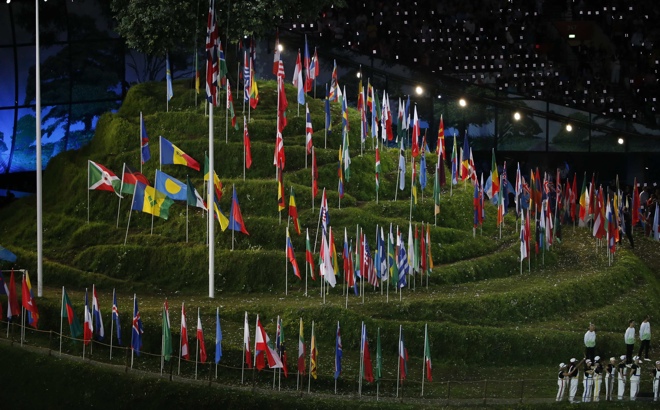
This was seen as a victory for the equality and the women’s rights movement in Saudi Arabia, but before that it was a victory for the IOC who declared that by London 2012 every national Olympic committee will have sent women to the Olympic Games.
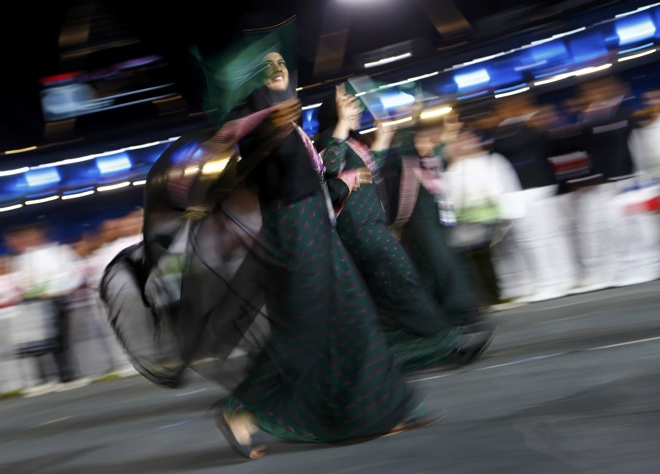
The two athletes chosen to Saudi Arabia were Wojdan Shaherkhani, a 16-year-old judoka from Makkah; and Sarah Attar, a 19-year-old runner who holds dual citizenship for the United States and Saudi Arabia.

In the Opening Ceremony, the two teenagers walked at the back of the delegation, dressed in traditional clothes. As they made their strides to follow their male counterparts, the girls waved Saudi flags and flashed victory signs with big smiles on their young faces.

On August 3, 2012, history was made. “In white,” the announcer declared, “the first woman ever from Saudi Arabia, Wojdan Shaherkani.” Accompanied by her father, an international judo judge himself, she stepped onto the red and yellow mat in the ExCel Center to compete at the +78kg judo event.
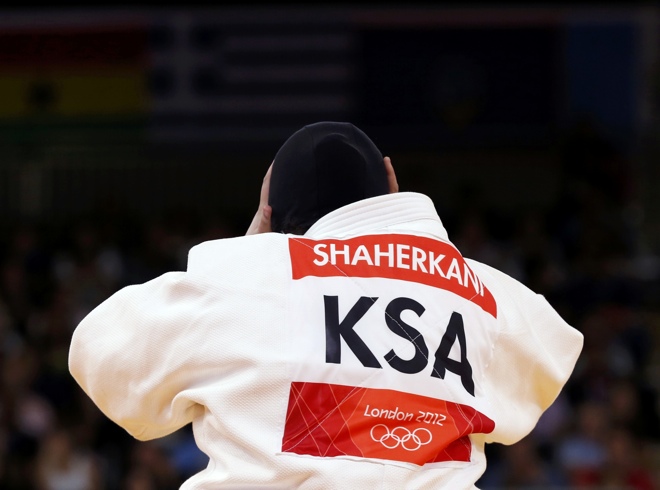
Wojdan was also making another first. It was the first time a judoka competes at the Olympics wearing the hijab. That hijab caused contention in the days leading to the competition. Saudi officials insisted that Wojdan would only compete wearing the hijab, while the International Judo Federation said hijab is not allowed for safety reasons. When the Saudis threatened they would pull out if she can’t wear hijab, a compromise was reached allowing her to cover her hair.
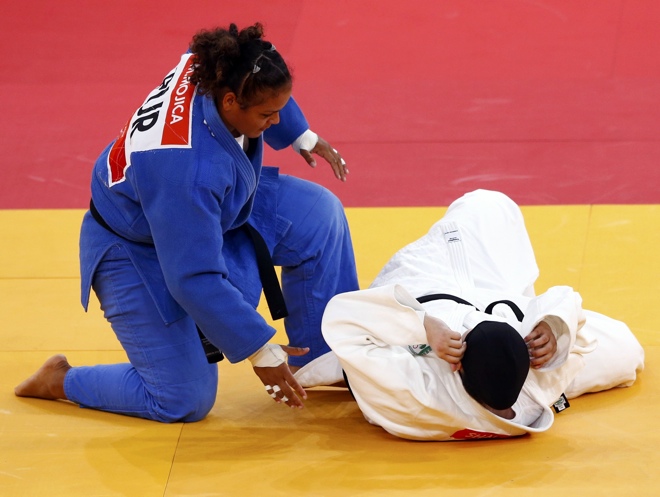
Faced with a far more experienced competitor, Wojdan did not last for too long on the mat. Puerto Rico’s Melissa Mojica needed only 82 seconds to defeat her young opponent. On Twitter, some Saudis who were against women’s participation mocked Wojdan, sometimes using ugly racial slurs. But many others said they are proud of her.
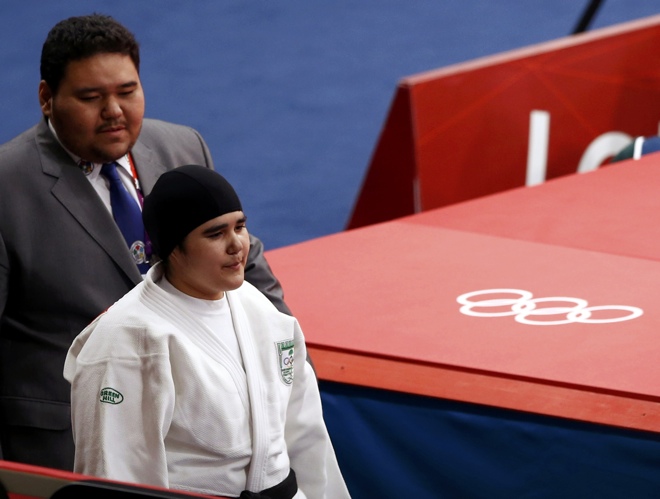
Wojdan’s father said he was going to sue people who insulted his daughter. He also said he had to pay all the expenses for his daughter’s participation. “No one at the Saudi Olympic Committee promised to reimburse me, and I don’t really care,” he said. “My daughter’s participation is the true honor.”
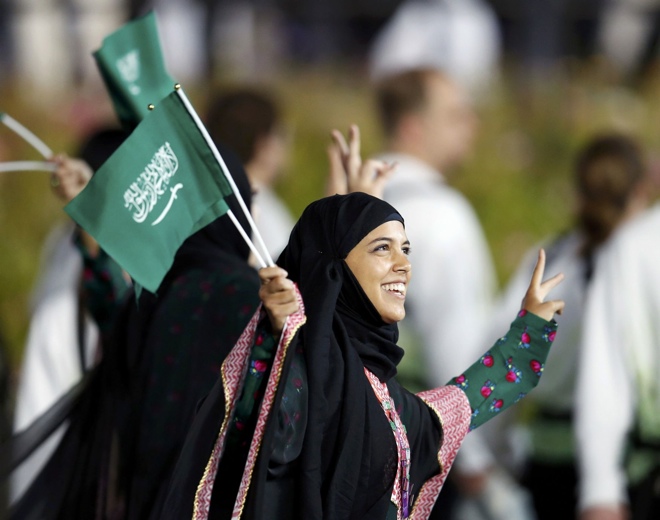
Five days later, it was the turn of Saudi Arabia’s second female athlete to make her appearance. Sarah Attar, born and raised in Escondido, CA. to a Saudi father and an American mother, took her place on the track of the Olympic Stadium to run in the 800m heat.
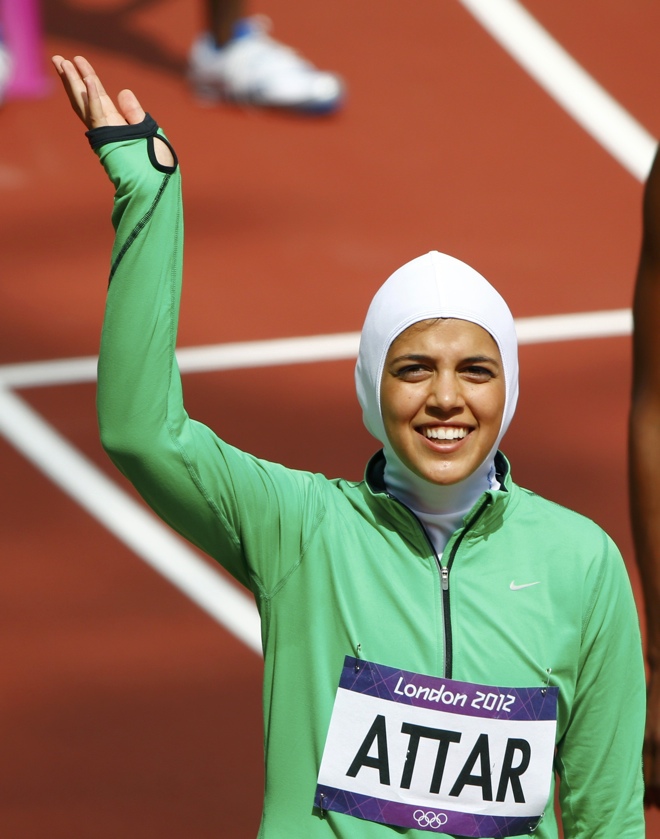
Wearing a white headscarf, a long sleeved green top and black leggings, a beaming Attar waved to the 80,000 spectators who filled the stadium. This was a new experience for the college student who goes to school and trains in San Diego.
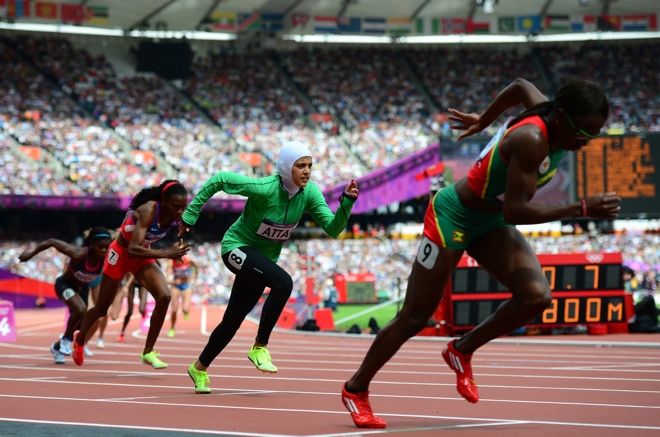
Few seconds after the race began, it was clear that Sarah had no chance to win. Other athletes ran past her, but she kept running. She was the last to finish the race, but she received a standing ovation from the crowd as she crossed the finish line, clocking at 2 minutes and 44.95 seconds. Her name was trending worldwide on Twitter.
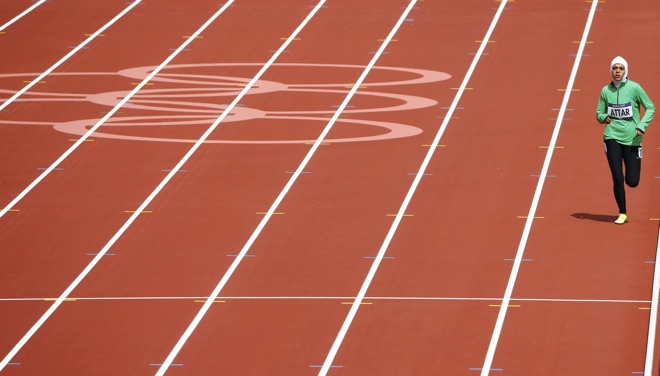
“It’s an incredible experience,” Sarah told reporters after the race. In an interview with the BBC, she said this was not about winning. “It was really about the cause being here … representing all the women over there” in Saudi Arabia.
From their living rooms, Saudi women watched with hope that what Wojdan Shaherkani and Sarah Attar did will be a meaningful step in the direction of changing women status in the country.

Incredibly proud of them.
I hope more and more saudis realise how pathetic is to marginalise women for public activities, including sport, especially compared with other countries.
Very proud of these young women! They have made their mark! Mabrook!
More than anything, I am proud of Sarah Attar specifically, and the other Saudi ladies in general, for standing up for something they believe in – doing whatever it takes to get in the Olympics, even if it meant wearing the hijab when they normally wouldn’t.
Terrific photos, at LAST! Judy c/o Manhattan Institute 52 Vanderbilt Avenue NY, NY, 10017
JudyMillerFreeSpeech@yahoo.com or JMiller@manhattan-institute.org
Tel: 646-839-3316 Fax: 212-599-3494 Cell 646-228-7573
http://www.JudithMiller.com Twitter: @jmfreespeech
>________________________________
We in Ireland have been overcome with Joy in the last week with our only Gold Medal won by Katie Taylor in Boxing, a 4 time World Champion, 5 time European Champion and now Olympic Champion from a small country- She broke down barriers also and is now a phenomenal role model in Ireland, so I congratulate Sarah and Wojdan for representing their country and the women of Saudi Arabia and being outstanding role models for the youth of their country, history will be very kind to these pioneers – well done !!
I’m very happy and proud of them !!!! They are winner with that fact of their participation as Saudi women in the Olympics games
Congradulations Saudi….next step swimmimg.
message to blog owner i have a request to make i dont know how much users do you got how daily check your blog if they are many or a single person o would like to say that please draw attention of higher authorizes of saudi arabia which i think is sleeping and the user against the film which has recently made by jews against Muslims. i ashamed of my saudi government today what are they doing saudi must perform a role for islamic states and what they are doing what they think by provding money to mujahedeen in pakistan lahore in masjid qadsiya for jihad they have done there work by giving charity or aid there duty is performed one christian girl was captured in Pakistan in case of blasphemy and within 72 hrs americans set him free and today jews made a film which hurts and hearts of billion muslims and what are we doing sleeping in our villas enjoying tv watching where protest has been preformed how many killed in iraq afganistan pakistan palesteen saudi government should be the protector of all the islamic states im ashamed that the lions of islam have forget there role.please draw attention of people hows souls are still alive.
It’s very sad and shameful that we celebrate because a girl participate in the Olympics while other countries celebrate because they reach other planets !
Ninety percent (90%) of unemployed Saudis are women. They are educated, able and eager to earn an honest living, but are denied the right to work. This is happening in a country that employs an estimated 8 million foreign nationals in its public and private sectors. However, after being marginalized by their government and society since the inception of the Saudi state in 1932, women are silent no more. They are not only speaking up against their repression; they are advocating for a reorientation of Saudi society and of the government’s political and economically driven discriminatory policies, dressed in religious and tradition excuses no one buys anymore, if they ever did.
Saudi women are not only demanding to work, but to drive themselves to their places of employment in order to emancipate themselves from financial and mobile dependence on their male relatives and the government’s handouts. Despite the resistance of the state’s autocratic and theocratic rulers and traditionalist males to women’s call for equality, women are slowly making their voices heard and some of their demands are being realized, albeit in a very limited way.
One of the major achievements Saudi women have accomplished in recent years is an increase in employment at stores that sell women’s lingerie. A number of years ago, a few courageous women, led by Jeddah-based economics professor Reem Asaad, organized a campaign to implement a shelved royal decree that called on businesses that sell women’s lingerie to hire Saudi saleswomen to replace the mostly foreign, male workers. The campaign gained domestic and global attention and propelled the Saudi King to support the women’s movement, or “Bra Revolution,” as described by some media outlets.
Despite Saudi King Abdullah’s support for the lingerie and make-up shops’ requirement to employ only Saudi saleswomen, it is evident that the government is doing very little to enforce this Royal decree. Foreign workers continue to dominate industries in which Saudi women are supposed to be operating. In addition, the regime seems hesitant to increase employment opportunities for women in other fields. Instead, the regime is focusing on the “Saudization” of jobs (requiring employers to hire Saudis to replace foreign workers) in fields that are off limits to women.
A conference held on October 3rd in Riyadh, entitled “Maximizing the Employment of Saudi Women,” discussed issues that lead to the exclusion of women from the public and private Saudi workforce such as the strict gender-regulation rules as well as how employers can create work environments for women that remain in line with the religious guidelines and cultural traditions that severely restrict women’s freedom.
Continuing to prevent Saudi women from using their full potentials to help build a better and more prosperous country is hurting Saudi Arabia financially, politically and socially. A recent report by the British-based Oxford Strategic Consulting, which was presented at the Riyadh conference, found that increasing the number of Saudi women in the workforce would significantly increase Saudi Arabia’s GNP as well as boost productivity and innovation in the Kingdom. The report even gives suggestions on how to increase women’s participation in the workforce despite the numerous destructive limitations imposed on them by their institutions.
Despite the Saudi regime’s unstated reasoning for restricting women’s full employment, women are a force to be reckoned with and continuing to repress them can only lead to instability and a violent outcome. Like their counterparts in other Arab countries, Saudi women are leading the way in transforming their country’s pre-modern institutions, male-dominated perceptions and treatment of women. The Saudi oligarchs are pursuing a failed policy toward women. It is hard to understand the Saudi ruling family’s state of mind.
How can the ruling princes not understand that millions of educated Saudi women see the world differently than their nomadic mothers and grandmothers who could not read or write? How can the ruling princes not understand that modern, educated Saudi women spend much of their time on social media debating their dissatisfaction with the status quo? Saudi women and men did not spend the recently celebrated national day dancing and singing in the streets (as it is not allowed), but instead decried their government’s failure to realize that the Saudi people, especially the younger generations, are part of the fast changing world in their region and globally.
Have you heard about Businessman Walid Al Jaffali Wedding to the Lebanese Supermodel Loujain Adada… I found some rare photos on http://www.katagogi.com/aida881925_1112230033_108728 …
I had waited for a female Saudi athlete since I was a little girl. It was a wonderful experience to see one out there.
Hmmm… Well am a muslim and also an an athlet (1500and5000m). Islamicaly is nt good 4 a female 2 perticipate in such a game, it’s nt our will it is our religion and as a good muslims we hv abide by our religion. Am nt hppy 4 saudi am evn ashamed as an islamic appex country 2 allow such a shamefull act.